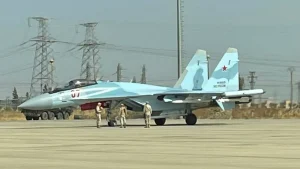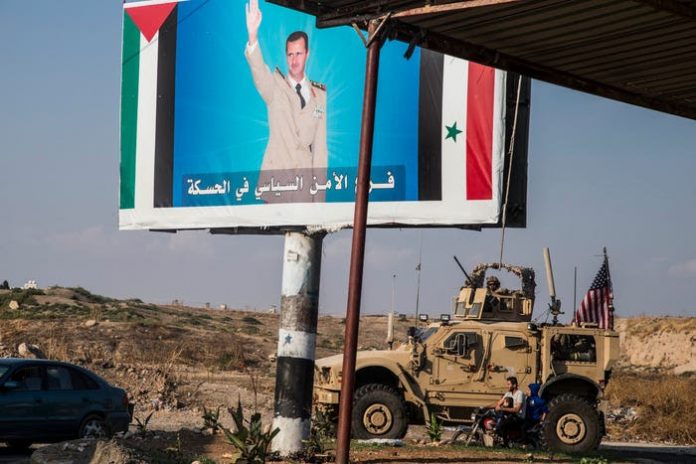In a noteworthy development yesterday, at least 100 Russian personnel and 4 helicopters were reportedly deployed to Qamishlo Airport in Rojava (also known as Northern Syria). Contrary to some predictions, Russian personnel have not withdrawn in large numbers from Syria nor Rojava at all since the invasion of Ukraine. In fact, it appears the number of Russian personnel in the region has only increased.
The presence of the Russian Air Force at Qamishlo Airport is part of what has deterred the Turkish state from a fourth invasion of Rojava. Throughout 2020 and 2021, it was expected that the Turkish state would invade again. In October of last year, the Russian state deployed its first squadron to Qamishlo Airport, effectively creating a de facto no-fly zone over Rojava. The longevity of this Russian no-fly zone is unclear, however some contend that the Russian state hopes to maintain a permanent presence at the airport.

Subtle shifts like this in the megapole dynamics of the Syrian Civil War have political repercussions across the world. From a social standpoint, small moves often have a serious impact on the outflow of displaced populations, and in turn the activity of global diaspora groups. The US withdrawal and subsequent Turkish invasion of Serekaniye in 2019 caused the displacement of over 300,000 people in a single week. In Europe this led to increased violence between diaspora populations, empowering Turkish diaspora groups to initiate mob attacks on Kurdish diaspora groups.
A simple relocation of a few hundred US soldiers led to the spilled blood and displacement of an entire region, which then led to pogroms in another continent. Had the Russian state not moved a squadron to Qamishlo Airport in 2021, we may be having an entirely different discussion right now addressing genocide. This goes to show just how deeply entwined the great powers still are in the affairs of Syria and Kurdistan, scrambling to opportunistically plant themselves in every crisis as if the Scramble for Africa jumped north a ways, leaving Africa for the Eastern powers.
From a strategic standpoint, the Russian state now has direct access to the border of Turkey and occupied Bakûr (Northern Kurdistan), a gift provided to Putin during the October 2019 US withdrawal. This is likely to cause some aneurysms in the NATO Headquarters at some point, if not already. So much for those ‘Turkey is in NATO to keep Russia away from Turkey’ assertions. Russian naval dominance over the Eastern Mediterranean and Suez Canal also arguably nullifies the significance of the ‘Turkey is in NATO to keep Russia away from the Bosphorus Strait’ assertions. With direly lowered ethical standards to accommodate questionable strategic interests, one must ask eventually, what really is the purpose of NATO?
Great power grappling over Rojava between the Russian, Turkish, and US states for geopolitical exploitation has come at the cost of thousands of Rojavayî lives. Turkish aggression aside, both the US and Russian presence are highly unpopular in many communities of Rojava. The US has enacted intensive efforts to plant corporations in the region, an operation which has failed miserably due to lack of local support. Despite having more lucrative options by cooperating with Western corporations, many Rojavayî oil workers have chosen to sell to the Syrian state instead, refusing to become dependent on a foreign occupier.
The Russian state’s persistent backing of the Baathist power structure in Syria has likewise earned it widespread disapproval among Rojava’s population. With ambiguous policies on Rojava and clear favoritism toward Syrian proxy forces, the Russian state is widely perceived to be abusing the region as a geopolitical rag doll. Civilian confrontations with Russian patrols are frequent, and Russian personnel have occasionally resorted to lethal force against protesters.
http://https://www.instagram.com/tv/CXHEe3dl1WR/?utm_medium=copy_link
There are layers of nuance to this blurry labyrinth of relative gains and psychological warfare that is Russian foreign policy. The Russian state has arguably displayed more sympathy for Rojava’s autonomy than the US has, becoming far more receptive to Turkish aggression since 2019 and even going to the extent of recognizing Rojava’s self-governance. Regardless, Rojavayîs aren’t buying that shit.
Much like US-NATO intentions that have been exhibited in Rojava, Russian presence is far more strategic than it is ethical. For better or worse, it does not seem the Russian megapole will be departing Rojava any time soon.



